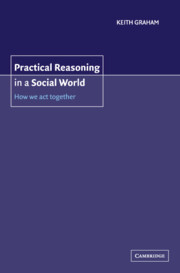Book contents
- Frontmatter
- Contents
- Preface
- Acknowledgements
- Introduction
- 1 Practical reasoning in context
- 2 The indistinctness of persons: causal interconnection
- 3 The indistinctness of persons: the personhood of collectivities
- 4 Practical collective identification and dissociation
- 5 Practical reasoning: sources and constraints
- 6 Practical reasoning and morality
- Conclusion
- Bibliography
- Index
Conclusion
Published online by Cambridge University Press: 22 September 2009
- Frontmatter
- Contents
- Preface
- Acknowledgements
- Introduction
- 1 Practical reasoning in context
- 2 The indistinctness of persons: causal interconnection
- 3 The indistinctness of persons: the personhood of collectivities
- 4 Practical collective identification and dissociation
- 5 Practical reasoning: sources and constraints
- 6 Practical reasoning and morality
- Conclusion
- Bibliography
- Index
Summary
Samuel Scheffler has described, and challenged, ‘a widespread though largely implicit conception of human social relations as consisting primarily in small-scale interactions, with clearly demarcated lines of causation, among independent individual agents’ (Scheffler 1995: 227). Associated with that conception is a claim made by Hart and Honoré about the connection between responsibility and the distinctness of persons construed as separateness. They argue that
the idea that individuals are primarily responsible for the harm which their actions are sufficient to produce without the intervention of others or of extraordinary natural events is important, not merely to law and morality, but to the preservation of something else of great moment in human life. This is the individual's sense of himself as a separate person whose character is manifested in such actions. Individuals come to understand themselves as distinct persons, to whatever extent they do, and to acquire a sense of self-respect largely by reflection on those changes in the world about them which their actions are sufficient to bring about without the intervention of others and which are therefore attributable to them separately.
(Hart and Honoré 1985: lxxx, cited in Scheffler 1995: 233)It will be evident from my arguments in this book that I believe Scheffler is right to challenge this conception of social relations. Small-scale interactions with clearly demarcated lines of causation are merely the tip of an enormous iceberg.
- Type
- Chapter
- Information
- Practical Reasoning in a Social WorldHow We Act Together, pp. 185 - 188Publisher: Cambridge University PressPrint publication year: 2002

